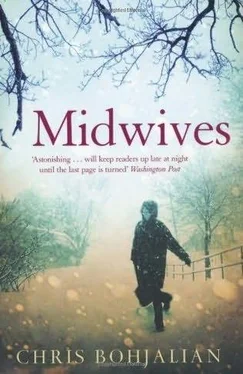Chris Bohjalian - Midwives
Здесь есть возможность читать онлайн «Chris Bohjalian - Midwives» весь текст электронной книги совершенно бесплатно (целиком полную версию без сокращений). В некоторых случаях можно слушать аудио, скачать через торрент в формате fb2 и присутствует краткое содержание. Жанр: Современная проза, на английском языке. Описание произведения, (предисловие) а так же отзывы посетителей доступны на портале библиотеки ЛибКат.
- Название:Midwives
- Автор:
- Жанр:
- Год:неизвестен
- ISBN:нет данных
- Рейтинг книги:5 / 5. Голосов: 1
-
Избранное:Добавить в избранное
- Отзывы:
-
Ваша оценка:
- 100
- 1
- 2
- 3
- 4
- 5
Midwives: краткое содержание, описание и аннотация
Предлагаем к чтению аннотацию, описание, краткое содержание или предисловие (зависит от того, что написал сам автор книги «Midwives»). Если вы не нашли необходимую информацию о книге — напишите в комментариях, мы постараемся отыскать её.
Midwives — читать онлайн бесплатно полную книгу (весь текст) целиком
Ниже представлен текст книги, разбитый по страницам. Система сохранения места последней прочитанной страницы, позволяет с удобством читать онлайн бесплатно книгу «Midwives», без необходимости каждый раз заново искать на чём Вы остановились. Поставьте закладку, и сможете в любой момент перейти на страницу, на которой закончили чтение.
Интервал:
Закладка:
We had not noticed it before-at least I hadn't-but we all understood instantly what my mother meant: The woman was standing across the street from the courthouse, instead of in front of the building itself, or on its steps. Someone-either the reporter herself or her partner with the camera-had apparently decided they would rather have the lake in the background than the Orleans County Courthouse.
"Everyone who isn't here who thinks about this will remember that water," my mother continued, "everyone who sees it on TV. Tomorrow or next week or whenever, that's what they'll remember when they picture this whole thing. That lake. That amazing and mysterious lake."
Any hopes Stephen had that the trial would not commence before Christmas had evaporated by the time the Labor Day weekend approached. We all knew it would be a fall affair. And only two days after Labor Day itself, the first Wednesday of September, we were officially informed of the date of the trial. It would begin Monday, September 29, and Stephen expected it would last at least two weeks. Maybe three.
During that unusually hot, arid summer-a July that wilted flower gardens early and stunted the corn, and an August that dried up a good many of our neighbors' wells-the case never lost what Stephen had referred to once around my mother as its "prosecutorial energy."
If anything, that person named Tanner seemed to me more rabid than ever as autumn arrived, as interested in persecuting my mother as he was in prosecuting her. And while in hindsight I know this was largely the perception of a teenager who didn't understand that "deposition" is merely a lawyer's term for court-sanctioned harassment, or the ways both the defense and the prosecution leverage court appearances for pretrial publicity, I know also there was some validity to my paranoia: Bill Tanner really was furious, Bill Tanner really was out for blood.
Neither Tanner nor his staff could believe that my mother had rejected the State's offer of a mere year in jail (of which she'd probably only serve six or seven months) and six years of probation in return for a guilty plea on the charge of involuntary manslaughter. If six years on probation sounded like a long time, they still thought it was a tremendously magnanimous and merciful offer: Despite the fact that Charlotte Bedford was dead, my mother would go to prison for barely half a year. Yes, she was expected to give up midwifery, but to them, that was a small price. It just didn't get any better than this, they must have thought; a deal couldn't get much sweeter.
Meanwhile, when the rumor of Tanner's offer circulated throughout the medical community, many doctors-especially obstetricians-were livid. Absolutely livid. The whole idea that a hippie midwife had killed some woman with a bedroom C-section (and in their diatribes, this was indeed the essential scenario) and might only go to jail for a few months had a good number of physicians enraged beyond reason. It seemed to me that some of them were spending more time writing editorials or letters to newspapers than they were practicing medicine, and Stephen took to calling the State Medical Board "the Furies," a shorthand reference even I understood.
Looking back, I still find it astonishing that so many doctors were so clearly unwilling to heed their own advice about stress.
From the window in my parents' bedroom, the one that faced our backyard and-in the far distance-Mount Chittenden, I watched my mother and Stephen sit back in two Adirondack chairs in the corner of the lawn by the porch. They'd moved the chairs so they were side by side and they could see the sun set through the damp fall air.
"Being pretty can be a disadvantage with a jury," Stephen was saying, and he stretched his legs through the leaves on the ground by his feet.
"You think too much. You think too much about the damnedest things."
"That's my job."
"Well, I don't think we need to worry that I'm so pretty we're at a disadvantage."
"It will be a factor in the voir dire. That's all I'm saying."
"The what?"
"The jury selection."
"The way your mind works. Unbelievable."
"I hope that's a compliment."
"I'm not sure. I just find it incredible."
"My mind?"
"This process. The very idea that because you think I'm pretty-"
"It's the idea that the jury will think you're pretty. What I think is irrelevant."
"Hah!"
"They will, Sibyl. You are an undeniably pretty woman. Undeniably. And with some jurors that will be an asset. With others, it will be a problem we'll have to overcome."
My mother and Stephen dangled their arms over the sides of their chairs, and their fingers picked at the grass just this side of dormancy and the fallen leaves that had begun to dry. Sometimes the tips of their fingers touched, occasionally the backs of their hands grazed. I wondered if they were savoring those brief, brief seconds when their skin brushed together.
"You're really going to let Connie watch?" my grandmother asked my mother one Saturday in mid-September, as if I weren't there having lunch with the two of them at our kitchen table.
"We're really going to let Connie watch," my mother said.
I imagine in her younger days my grandmother had been an extremely tolerant woman. Her daughter, after all, had dropped out of Mount Holyoke to live with an older man on Cape Cod, and then spent a winter with the Black Panthers in Boston. When Sibyl had finally returned to Vermont, she got pregnant before she got married, and she'd done both very young. And even if this had been "the sixties"-an umbrella rubric for a variety of excesses and an excuse for all sorts of otherwise antisocial behaviors-one might have expected a certain amount of mother-daughter tension. But they always insisted there had been none, a point of family history my father says he can corroborate from at least the moment he entered my mother's life.
By the time Charlotte Fugett Bedford died, however, my grandmother had grown more conservative. Her own husband, my grandfather, had died ten years earlier, and a decade of living alone had made her slightly skittish, wary, and quick to frown or find fault. And, of course, the woman who watched her daughter on trial was considerably older than the woman whose daughter had dropped out of college: She had aged from her early fifties to her mid-sixties, and she was no more exempt from the anxieties of age than anyone else.
Nevertheless, my Nonny-my name for her, even at fourteen-was still a warm and energetic woman when I was growing up. My mother's tendency to hug friends on sight was at least partly genetic, and I'll never lose my love for the vaguely floral, vaguely antiseptic smell of my Nonny's hair spray: I'd get a strong whiff of it with every embrace.
In any case, when it was clear that the charges against my mother would not be settled without a trial, Nonny tried hard to convince my parents to keep me away from the courtroom. She thought it would be a scarring experience, and while there were certainly people attending the trial who would have agreed with her-especially in light of my eventual breakdown-my parents knew how desperately I wanted to be there. Moreover, I think they realized that it would be equally scarring for me to hear important details second-hand in the girls' bathroom at school. And so it didn't matter that I'd miss two (and perhaps three) weeks of classes; it didn't matter that I'd see all sorts of frightening pieces of evidence; it didn't matter that I'd hear truly terrible things said about my mother, or have to watch a variety of witnesses in all likelihood sob on the stand.
No one, after all, expected Asa Bedford to keep his composure throughout the entire proceedings, or Anne Austin to endure without tears what Stephen himself said would be a "withering search-and-destroy, free-fire, relentlessly savage" cross-examination. And I think both my father and Stephen had begun to wonder by September how even my mother would do. We could all see she was growing quiet and morose-not so much gloomy, as tired beyond the rejuvenating powers of sleep-and in their own ways they were constantly trying to rally her spirits.
Читать дальшеИнтервал:
Закладка:
Похожие книги на «Midwives»
Представляем Вашему вниманию похожие книги на «Midwives» списком для выбора. Мы отобрали схожую по названию и смыслу литературу в надежде предоставить читателям больше вариантов отыскать новые, интересные, ещё непрочитанные произведения.
Обсуждение, отзывы о книге «Midwives» и просто собственные мнения читателей. Оставьте ваши комментарии, напишите, что Вы думаете о произведении, его смысле или главных героях. Укажите что конкретно понравилось, а что нет, и почему Вы так считаете.











